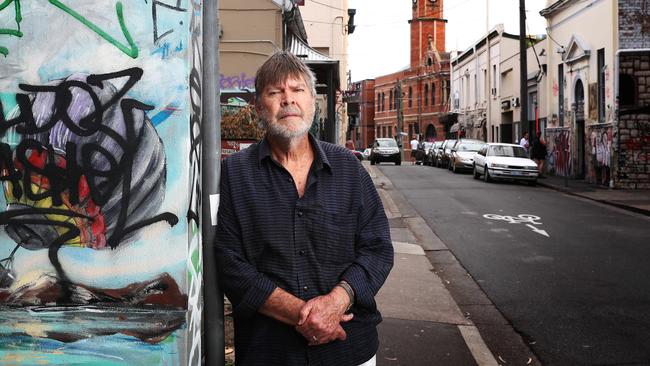Peter Corris calls time on Cliff Hardy and book writing
Win, Lose or Draw, the 42nd Cliff Hardy book will be author Peter Corris’s last on the famed private detective.

He has survived war, boxing bouts, close calls with cruel criminals and crooked cops, and a quadruple bypass, but now Australia’s most famous fictional private eye faces his darkest moment: his author’s decision that the next book about him will be the last. Will Peter Corris, the godfather of Australian crime fiction, kill off Cliff Hardy?
That’s the overwhelming question rippling through the dramatic pages of Win, Lose or Draw, the 42nd and final Cliff Hardy book, to be published by Allen & Unwin on January 3.
“I’m not sure if it’s what the readers want,’’ ponders Corris, 74, when asked about Hardy perhaps shuffling off this mortal coil.
It’s a tough decision for any author — even Arthur Conan Doyle had to resurrect Sherlock Holmes after tossing him down a Swiss waterfall. Corris says, however, that this is the end for Hardy, whether or not he carks it on the page.
Readers will miss him, as will his creator, who has lived with him since starting the first book in 1976.
“I have never dreamed about him, and never dreamed that I am him,’’ he says with a laugh when asked how close they are. “But when I am writing there is a fusion between us — he has a similar sense of humour to me and a similar outlook on the world. It feels like shrugging on an old coat.’’
Win, Lose or Draw also will be Corris’s final book.
He is almost blind from irreversible eye problems. Though optimistic he won’t lose his sight completely, Corris has decided writing books has become impossible. He has also written historical fiction and biographies, including of Fred Hollows, a bestseller, and Philip Nitschke.
“I’m not going to write any more fiction or nonfiction and I will miss it badly,’’ Corris says. “I used to write every day, even Christmas Day, with a big glass of wine. Now I depend on talking books and TV.’’
This Christmas he will be with his wife, writer Jean Bedford, their children and grandchildren. “They are the joy of my life,’’ he says of his six grandsons and one granddaughter.
Corris was keen to meet at a pub in Sydney’s inner-west Newtown because it’s one where Hardy loiters with intent in the 2010 novel Torn Apart.
“Cliff is an old-fashioned Australian, and I feel I am nostalgic for a less homogenised Australia.’’
Corris published the first Cliff Hardy novel, The Dying Trade, in 1980 and in the decades since the tall, lean, smart, tough but compassionate Sydney sleuth has become part of our culture, a guide to the seamier, underworld side.
Bryan Brown, born to play Hardy, starred in the 1985 adaptation of The Empty Beach, a film the author does not like, though he thinks Brown was good in the role.
The Cliff Hardy novels are more than crime fiction. They are also social histories of suburban Sydney, written by a Melburnian who moved north in the mid ’70s.
Hardy was born in beachside Maroubra, when it was working class.
“I call myself a naturalised New South Welshman,’’ Corris says.
“My only attachments to Melbourne are passionate support for (AFL team) Essendon and an annual bet on the Melbourne Cup.’’
In Win, Lose or Draw, Hardy is hired by a rich businessman to find his missing 16-year-old-daughter. She’s intelligent, beautiful and surprising, as is the rest of her kin, not to mention the killers, drug dealers, pimps, hustlers and bent cops Hardy has to deal with in Sydney, Coolangatta and Norfolk Island.
“A concerned but emotionally ill-equipped father, a damaged son, a wayward daughter and a crazy wife and stepmother,’’ he thinks. “It all made my other missing persons case seem simple.’’
Fellow crime writer Shane Maloney once summed up Hardy as someone who “remains a hard bloke to kill”. Will that change in the new year? There’s only one way to find out.



